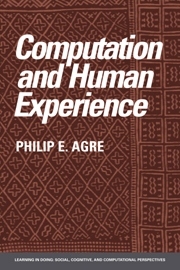Book contents
- Frontmatter
- Contents
- Preface
- 1 Introduction
- 2 Metaphor in practice
- 3 Machinery and dynamics
- 4 Abstraction and implementation
- 5 The digital abstraction
- 6 Dependency maintenance
- 7 Rule system
- 8 Planning and improvisation
- 9 Running arguments
- 10 Experiments with running arguments
- 11 Representation and indexicality
- 12 Deictic representation
- 13 Pengi
- 14 Conclusion
- Notes
- References
- Author index
- Subject index
2 - Metaphor in practice
Published online by Cambridge University Press: 07 December 2009
- Frontmatter
- Contents
- Preface
- 1 Introduction
- 2 Metaphor in practice
- 3 Machinery and dynamics
- 4 Abstraction and implementation
- 5 The digital abstraction
- 6 Dependency maintenance
- 7 Rule system
- 8 Planning and improvisation
- 9 Running arguments
- 10 Experiments with running arguments
- 11 Representation and indexicality
- 12 Deictic representation
- 13 Pengi
- 14 Conclusion
- Notes
- References
- Author index
- Subject index
Summary
Levels of analysis
The Introduction has sketched the notion of a critical technical practice, explored the distinctive form of knowledge associated with AI, and described a reorientation of computational psychology from a focus on cognition to a focus on activity. It should be clear by now that I am proceeding on several distinct levels at once. It is time to systematize these levels and to provide some account of the theses I will be developing on each level.
On the reflexive level, one develops methods for analyzing the discourses and practices of technical work. Reflexive research cultivates a critical self-awareness, including itself among its objects of study and developing useful concepts for reflecting on the research as it is happening. To this end, I will begin by suggesting that technical language – that is, language used to investigate phenomena in the world by assimilating them to mathematics – is unavoidably metaphorical. My reflexive thesis is that predictable forms of trouble will beset any technical community that supposes its language to be precise and formally well defined. Awareness of the rhetorical properties of technical language greatly facilitates the interpretation of difficulties encountered in everyday technical practice. Indeed, I will proceed largely by diagnosing difficulties that have arisen from my own language – including language that I have inherited uncritically from the computational tradition, as well as the alternative language that I have fashioned as a potential improvement.
On the substantive level, one analyzes the discourses and practices of a particular technical discipline, namely AI. Chapter 1 has already outlined my substantive thesis, which has two parts.
- Type
- Chapter
- Information
- Computation and Human Experience , pp. 27 - 48Publisher: Cambridge University PressPrint publication year: 1997



